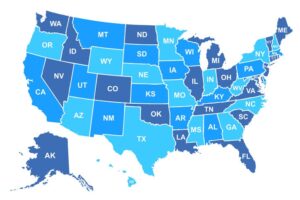True Crime of Insurance Fraud Video Number 53

See the full video at https://rumble.com/v10mpod-true-crime-of-insurance-fraud-video-number-53.html and at https://youtu.be/FG2v3BfrVgw
INDIANA
The state of Indiana paid some $1.1 million in Medicaid-related payments in 2016 and 2017 to managed-care organizations (MCO) on behalf of beneficiaries who were dead, according to federal auditors reported by the United States Department of Justice.
2016 and 2017 to managed-care organizations (MCO) on behalf of beneficiaries who were dead, according to federal auditors reported by the United States Department of Justice.
The audit, carried out by the Department of Health and Human Services Office of Inspector General (OIG) and released on February 13, 2020 revealed that in a random sample of 100 so-called capitation disbursements made to MCOs, the state of Indiana “made 95 unallowable payments.”
The Office of the Attorney General found:
Indiana made capitation payments on behalf of deceased beneficiaries. We confirmed that 70of the 71beneficiaries associated with the 100 capitation payments in our stratified random sample were deceased. Of the 100 capitation payments, Indiana made 95 unallowable payments totalling $79,403 ($58,773 Federal share). On the basis of our sample results, we estimated that Indiana made payments totalling at least $1.1 million ($862,097 Federal share) to MCOs on behalf of deceased beneficiaries during our audit period.
Indiana did not always fully process Medicaid beneficiaries’ death information in the MMIS. Although the State agency’s eligibility systems interfaced with Federal and State data exchanges that identify dates of death, the State agency did not enter the dates of death in the MMIS for 48 of our sampled beneficiaries. Additionally, the State agency did not recover the capitation payments for 22 sampled beneficiaries that did have a date of death in the MMIS.
The organizations that received the unlawful payments are part of the Medicaid Managed Care health care delivery system.
Medicaid agencies and managed care organizations (MCOs) that accept a set per member per month (capitation) payment for these services,” the Medicaid program site states. MCOs use capitation payments to manage health care costs, utilization, and quality.
The OIG concluded that the State agency made capitation payments on behalf of deceased beneficiaries. OIG confirmed that 70 of 71 beneficiaries associated with the 100 capitation payments in our sample were deceased. Of the 100 capitation payments, the State agency made 95 unallowable payments totalling $79,403 ($58,773 Federal share).
The State agency did not recover any of the 95 sampled capitation payments. On the basis of the sample results, the DOJ estimated that the State agency made payments totalling at least $1.1 million10($862,097 Federal share) to MCOs on behalf of deceased beneficiaries for service dates during the audit period.
Yet aspects of the system have been plagued by problems, with the Indiana report coming on the heels of others that similarly found that some states had improperly paid capitation payments on behalf of the deceased.
Similarly, an audit released in September 2019 found that Illinois paid an estimated $4.6 million to MCOs to cover deceased Medicaid beneficiaries. Illinois Medicaid administrator Doug Elwell acknowledged the findings in a written response to the audit and said state authorities would try to recover the improper payments and refund them to the federal government.
Similarly, Indiana Medicaid Director Allison Taylor said in a written response included in the audit that the state agrees with the conclusions of the report and will seek to recoup the payments.
There are more than 71 million people currently covered under Medicaid, the social safety net program created five decades ago and expanded by President Barack Obama through the Affordable Care Act, commonly known as Obamacare. The Trump administration has sought to reform the system, recently announcing that it would test letting state Medicaid programs limit health benefits and prescription drug coverage for some patients in return for changing how federal government contributions to the states are made.
The Failure of the State Agency
The contracts between the State agency and the MCOs required compliance with the provisions in Indiana’s Hoosier Healthwise and Healthy Indiana Plan MCE Policies and Procedures Manual, which states that beneficiaries’ enrolment will be terminated upon death and that payments to the MCO will be adjusted for retroactive disenrollment of the beneficiaries.
The State agency did not always process Medicaid beneficiaries’ death information or recover capitation payments in the MMIS. When the State agency properly processes death information, the MMIS uses that information to identify a beneficiary as deceased, stop future capitation payments, and initiate the recovery process for capitation payments that were made after the beneficiary’s month of death.
What OIG Recommended
The Office of the Attorney General recommended that Indiana:
refund $862,097 to the Federal Government;
identify and recover unallowable payments made to MCOs during our audit period on behalf of deceased beneficiaries, which we estimate to be at least $1.1 million;
identify capitation payments made on behalf of deceased beneficiaries before and after our audit period, and repay the Federal share of amounts recovered; and
ensure that dates of death are added to the MMIS and that capitation payments made after the beneficiaries’ deaths are recovered
Unallowable Payments for Beneficiaries Who Had a Date of Death
Dates of death were recorded in the MMIS for 22 of the 70 deceased beneficiaries. Nevertheless, the State agency made unallowable payments on behalf of these deceased beneficiaries. The State agency stated that it would conduct further research to determine why it did not recover the 27 capitation payments for these beneficiaries.
Michigan
The OIG estimated that Michigan made unallowable capitation payments totalling at least $39.9 million ($27.5 million Federal share) to managed care entities on behalf of deceased beneficiaries during our audit period. Of the 100 capitation payments in the stratified random sample, Michigan made 99 unallowable payments totalling $117,746 ($79,348 Federal share).
The unallowable payments occurred because Michigan did not always identify and process Medicaid beneficiaries’ death information. Although Michigan’s MMIS and eligibility systems interfaced with State and Federal death files that identify dates of death, Michigan did not always identify those dates of death in its MMIS system, and the MMIS system and eligibility system did not share dates of death information with each other. Michigan also did not recover payments caused by dates of death not promptly identified in its MMIS system.
OIG recommended that Michigan (1) refund $27.5 million to the Federal Government; (2) identify and recover unallowable payments made to managed care entities during our audit period on behalf of deceased beneficiaries, which OIG estimated to be at least $39.9 million; and (3) identify capitation payments made on behalf of deceased beneficiaries before and after the audit period and repay the Federal share of amounts recovered.

(c) 2022 Barry Zalma & ClaimSchool, Inc.
Barry Zalma, Esq., CFE, now limits his practice to service as an insurance consultant specializing in insurance coverage, insurance claims handling, insurance bad faith and insurance fraud almost equally for insurers and policyholders. He practiced law in California for more than 44 years as an insurance coverage and claims handling lawyer and more than 54 years in the insurance business. He is available at http://www.zalma.com and zalma@zalma.com.
Subscribe to Zalma on Insurance at locals.com https://zalmaoninsurance.local.com/subscribe.
Subscribe to Excellence in Claims Handling at https://barryzalma.substack.com/welcome.
Write to Mr. Zalma at zalma@zalma.com; http://www.zalma.com; http://zalma.com/blog; daily articles are published at https://zalma.substack.com. Go to the podcast Zalma On Insurance at https://anchor.fm/barry-zalma; Follow Mr. Zalma on Twitter at https://twitter.com/bzalma; Go to Barry Zalma videos at Rumble.com at https://rumble.com/c/c-262921; Go to Barry Zalma on YouTube- https://www.youtube.com/channel/UCysiZklEtxZsSF9DfC0Expg; Go to the Insurance Claims Library – https://zalma.com/blog/insurance-claims-library/
Barry Zalma, Esq., CFE presents videos so you can learn how insurance fraud is perpetrated and what is necessary to deter or defeat insurance fraud.
Like this:
Loading…
Related




